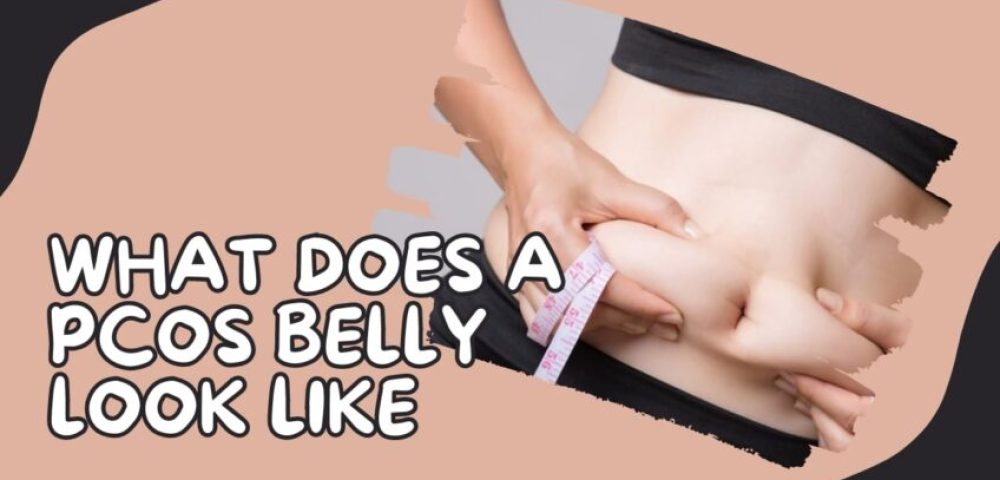Polycystic ovary syndrome (PCOS) is a common hormonal disorder that affects numerous women of reproductive age. A prevalent symptom is abdominal weight gain, often referred to as the PCOS belly.
The PCOS belly differs from other types of weight gain, as many women experience a larger stomach while the rest of their body remains unchanged. This means that even slender individuals can have PCOS.
Fortunately, there are several strategies to address this condition.
In this article, we’ll discuss:
- What is PCOS?
- What does a PCOS belly look like?
- How do you know if you have a PCOS belly?
- Causes
- Risk factors
- What can you do about it?
- Exercises for PCOS belly
- PCOS diet
Page Contents
What Is PCOS?
Polycystic ovary syndrome (PCOS) is a hormonal disorder that affects women of reproductive age. It is marked by small cysts on the ovaries and elevated levels of androgen (male) hormones. In addition to female hormones, women also produce the male hormone testosterone, which typically exists in harmony with other hormones. However, women with PCOS experience abnormally high male hormone levels.
This hormonal imbalance prevents egg cells from maturing correctly, leading to the formation of cysts. Women with PCOS may have multiple cysts on their ovaries. It is important to note that not all women with PCOS have ovarian cysts, so it is essential to be aware of other symptoms, such as:
- Excessive facial hair
- Abnormal or irregular periods
- Acne
- Male pattern baldness or thinning hair
- Skin tags
- Weight gain, typically in the lower abdominal area
How Do You Know if You Have a PCOS Belly?
There’s no specific test to diagnose PCOS, so your doctor will make an assessment based on the following:
- A waist-to-hip ratio of >0.87 may indicate the presence of PCOS
- A discussion of your menstrual history, dietary habits, lifestyle, and genetics
- A blood test to determine if you have high male hormones
- A pelvic ultrasound to diagnose polycystic ovaries
What Causes It?
Women with PCOS often experience higher fat deposits in the abdominal area, regardless of their body mass index. This means that even women with lean bodies or normal weight can develop a PCOS belly.
Experts believe that the increased male hormones in women contribute to the development of a PCOS belly. Other factors that may contribute to a large and bloated stomach include insulin resistance, genetics, hormonal imbalances, metabolic defects, and inflammation.
To better understand what a PCOS belly is, it’s essential to know the two types of body fat: subcutaneous and visceral fat.
Subcutaneous fat is stored beneath the skin and feels soft when touched. Although it is less harmful, it can still be difficult to lose.
In contrast, visceral fat is not easily felt as it is located deep within the belly, surrounding internal organs. This type of fat is considered more dangerous to one’s health.
Having excessive visceral fat poses a risk factor for PCOS and other metabolic issues. However, the good news is that visceral fat is generally easier to lose.
What Does a PCOS Belly Look Like?

As previously stated, the shape of a PCOS belly differs from other types of weight gain. It often appears large and bloated but can also be small and round, depending on genetics and other factors. The PCOS belly involves the accumulation of visceral fat in the lower abdomen and typically feels firm to the touch.
A PCOS belly is also characterized by a high waist-to-hip ratio of greater than 0.87 (apple body shape). However, some individuals may not experience any noticeable changes in their stomach. In such cases, it’s essential to watch for other symptoms of PCOS.
Risks and Related Weight Gain
Abdominal fat is considered the most dangerous, as it surrounds internal organs and increases the risk of developing severe health problems, including heart disease, high blood pressure, type 2 diabetes, and liver issues.
Other risks associated with a PCOS belly include:
Subfertility: Women with PCOS have cysts in or on their ovaries, which can disrupt ovulation. Excess weight can also impact a woman’s fertility, making it more difficult to become pregnant. Fortunately, treatment options and lifestyle changes can help resolve this issue.
Endometrial cancer: Women undergo a monthly buildup of the endometrial lining, which is shed through menstruation. However, for women with PCOS, the lining is not adequately shed due to irregular periods, increasing the risk of endometrial cancer.
Sleep apnea: Increased body weight and elevated testosterone levels in PCOS heighten the risk of obstructive sleep apnea.
How Can I Get Rid of My PCOS Belly?
Losing a PCOS belly is crucial for alleviating the symptoms and health issues associated with PCOS. However, it can be quite challenging. Here are some long-term solutions that require patience:
Eat Healthily
A nutritious and well-balanced diet is essential for managing a PCOS belly. While there is no ‘one-size-fits-all’ diet for PCOS, a diet should generally focus on reducing insulin resistance and inflammation to decrease belly fat and promote weight loss. Some diets that have shown favorable research results for PCOS include:
Low Glycemic Index (GI) Diet
A low GI diet is one of the best treatments for PCOS, as high insulin levels can exacerbate PCOS symptoms. Foods with a low GI are digested more slowly by the body, preventing fluctuations and spikes in blood sugar. These foods also keep you full longer to avoid overeating.
Some of the foods to include in a low GI diet are:
- Whole grains
- Vegetables
- Legumes
- Nuts
- Seeds
- Whole fruits rather than juices
- Lean proteins, such as fish and chicken breast
High GI foods to avoid include:
- White rice
- White and whole wheat bread
- Cakes, cookies, and sweet treats
- Breakfast cereals and cereal bars
- Sweetened dairy products, like fruit yogurts
- Dried fruits, such as dates, raisins, and cranberries
- Crisps and rice crackers
- Potatoes and fries
- Sugar-containing beverages, including soda, sweet tea, and sports drinks
Anti-Inflammatory Diet

As mentioned earlier, inflammation plays a significant role in PCOS. Thus, an anti-inflammatory diet can help reduce symptoms. Many foods can be included in an anti-inflammatory diet, such as:
- Nuts
- Berries
- Green, leafy vegetables
- Seeds
- Natural sweeteners like maple syrup
- Beans and lentils
- Whole grains
- Olive and coconut oils
- Berries
- Fatty fish
- Tomatoes
- Broccoli
- Avocados
- Green tea
- Mushrooms
- Dark chocolate and cocoa
Dietary approaches to stop hypertension (DASH) diet. The DASH diet was initially created to help lower blood pressure. This diet is rich in vegetables, fruits, and whole grains and includes low-fat dairy products, fish, poultry, beans, and nuts. The diet limits foods high in saturated fat, refined grains, sodium, and sweets.
In a study, overweight women with PCOS who followed the DASH diet showed significant improvements in insulin resistance and lost abdominal fat.¹
Based on the information above, a general PCOS diet would include:
- Eating whole foods, such as vegetables, fruits, nuts, whole grains, eggs, and meat.
- Consuming more complex carbs while limiting simple sugars.
- Including healthy fats, like olives, avocados, oily fish, nuts, and seeds.
- Reducing dairy products (milk, cheese, yogurt, and cream).
- Avoiding processed foods, including packaged foods, additives, and added sugars.
- Eating enough protein and fiber.
- Drinking plenty of fluids (plain water, herbal teas, and hot beverages).
- Avoiding or limiting alcohol consumption.
- Incorporating probiotic (fermented) and prebiotic (fiber) foods.
- Reducing caffeine intake.
- Eating fermented foods to promote gut health and weight management.
As you make healthy food choices, practicing mindful eating can also be beneficial. It allows you to be more aware of bodily cues like hunger, cravings, and fullness. By doing so, you can address problematic eating behaviors such as emotional eating and binge eating, which helps prevent weight gain.
Exercises for PCOS Belly

Maintaining a healthy weight involves not only the calories you consume but also the ones you burn. For this reason, you’ll need regular exercise to help with PCOS-related weight loss.
It’s essential to get the right type and amount of exercise, depending on your overall weight, age, and energy levels. Remember that you cannot spot-reduce fat; hence, you must adopt a whole-body approach to eliminate your PCOS belly.
To achieve the best results, exercise should include both aerobic and weight/resistance training.
Some great exercises include:
- High-intensity activities such as HIIT
- Strength-training exercises like Pilates and weightlifting
- Yoga
- Walking
- Sports such as hockey and tennis
As suggested by the Centre for Research Excellence in PCOS, women who want to maintain their health and current weight should do:
- 150 minutes per week of moderate-intensity activity OR 75 minutes per week of vigorous activity OR a combination (Moderate exercise causes an increase in heart rate, but you can still maintain a conversation. Vigorous exercise increases the heart rate — you’ll be sweating and panting, so you generally cannot have a conversation.)
- Weight training twice per week on non-consecutive days
For women who need to improve their health and wish to lose weight, it is suggested to do:
- 300 minutes per week of moderate-intensity activity OR 150 minutes per week of vigorous activity, OR a combination
- Weight training twice per week on non-consecutive days
Theodore is a prolific author at Fischer Institute, known for his insightful articles on health and nutrition. His expertise spans a wide range of topics, from the benefits of traditional foods to the latest in health trends, always aiming to educate and empower readers towards better wellbeing.
Also Read:
- Does Creatine Make You Gain Weight? - Strategies for…
- Learn New Food Recipes by Watching these Cooking…
- Dry Needling for Plantar Fasciitis: Is It Effective?
- Should You Take Pre-Workout on an Empty Stomach - Is…
- Main Causes of Nutrient Deficiencies and Effective Solutions
- How to Get Pee Out of a Mattress: Effective Cleaning…















